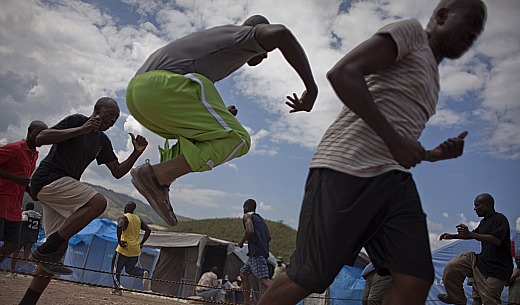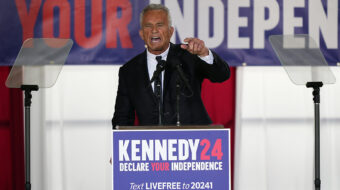
In spite of problems caused by disorganization and possible fraud, the Provisional Elections Council (Conseil Electoral Provisoire) of Haiti announced April 4, that singer and businessman Michel “Sweet Mickey” Martelly has apparently won the March 20 runoff elections by a landslide over former First Lady Mirlande Manigat.
According to a preliminary count, Martelly, who ran as the “Repons Peyizan” (People’s Response) Party candidate, got 716,986 votes or 67.57 percent of the vote. Manigat, running under the banner of the “Ressamblement des Democrats Nationaux Progressistes” (Rally of Progressive National Democrats), got 336,747 votes or 31.47 percent of votes caste.
The electoral council says that there are 4,694,961 registered voters in Haiti. If the vote tallies were accurate and complete, this would mean that the turnout rate was about 22 percent, marginally different from the turnout for the general election on November 28.
Final results will be announced April 16, at which point current President Rene Preval will leave office, and in all likelihood Mr. Martelly will be sworn in.
Martelly is well known in Haiti as a performer of the “compas” style of Haitian dance music. Always aligned with the political right and friendly with people associated with former dictator Jean-Claude Duvalier, Martelly strongly supported the overthrow of elected president Jean Bertrand Aristide in 2004.
Mrs. Manigat is also a figure of the right but has less of a populist image. For example, the name of the Party under which Martelly ran is in Kreyol, Haiti’s majority French-based but African-influenced language, while that of Mrs. Manigat is in Parisian French.
Though some criticize Martelly for his attention-getting antics on stage, such as dropping his pants at key moments, he managed to capitalize politically on his popularity as a singer, especially with youth.
Martelly, like many other candidates, has criticized the government of Mr. Preval for its torpor in responding to the destruction and suffering caused by the January 2010 earthquake, in which as may as 300,000 people were killed, and the subsequent cholera epidemic, which is still going on. Promised aid has been slow to arrive, and rebuilding has hardly begun, while thousands still live in makeshift shelters.
Had the Fanmi Lavalas Party, of former President Aristide, been allowed to run a candidate in the presidential election, the situation might have been very different.
Aristide and his party are said to be extremely popular still among poor Haitians, and some of the populist youth vote that went to Martelly might have gone to a Fanmi Lavalas candidate.
However, the government of Preval, a former Aristide ally, made sure that Fanmi Lavalas could not run because of a technicality, resulting in the very low turnout in November and March and possibly clinching the Martelly victory. The candidate of Preval’s own INTE (Unity) Party, Jude Celestin, was to be in the runoff instead of Martelly, but, based on a review of votes by an Organization of American States panel, was pressured to withdraw and was replaced by Martelly.
The United States embassy in Port au Prince has expressed satisfaction with the election results.
There has been particular concern by the United States, France and Canada that nobody aligned with Aristide be permitted to win the Haitian presidency. Aristide returned from exile just before the runoff, in spite of U.S. efforts to pressure the government of South Africa, where he had been in exile, not to let him leave. Aristide had called for France to pay reparations to Haiti for money the French government had extorted from Haiti in the 19th and early 20th century.
For his part, Preval may have been moving, very cautiously, to align Haiti with some of the social and development programs of the Bolivarian Alliance for the Peoples of Our America (ALBA), in which Cuba, Venezuela, Bolivia and Ecuador are major players.
Martelly’s program includes vague promises of building houses and ending poverty, which will entail a focus on more foreign direct investment of the type the U.S., France and Canada are promoting. He will likely drop Preval’s approaches to Petrocaribe and other ALBA programs. He has said he will restore the army, which was abolished by Aristide in 1995 after many years of abuses and repression under the two Duvaliers, Francois “Papa Doc” and Jean-Claude “Baby Doc”, and their immediate successors. There are many reports of former Duvalierist soldiers signing up and undergoing military training by various non-government people, although some of these projects may turn out to be money-making scams.
Photo: Civilian volunteers run through an obstacle course during military training from veterans of Haiti’s former army in Port-au-Prince, Haiti. Haiti has been without an army since 1995, when President Jean-Bertrand Aristide disbanded the military after he was deposed in a coup and then restored to power with the help of U.N. forces. Michel Martelly was recently announced the winner in Haiti’s presidential runoff elections and supports restoring the armed forces in some form. (AP Photo/Ramon Espinosa).












Comments